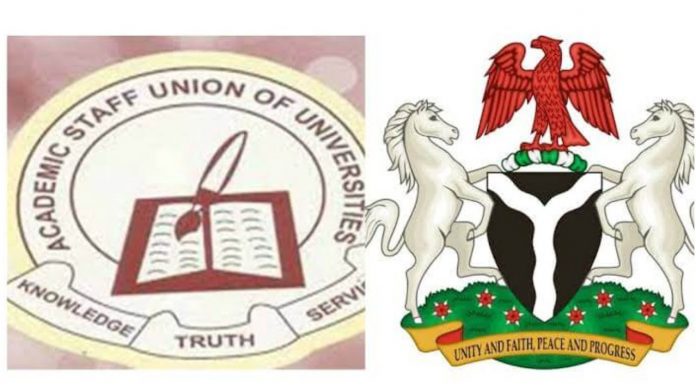When two elephants fight, the grass suffers. Over the years, this has been the fate of numerous helpless students in the country’s universities who cannot afford the high tuition fees at private universities, let alone travel overseas for education, but have accepted their fates in public schools.
Absolutely, nothing is wrong with attending public schools except some shortfalls and extremism. Prominent among them is the strike action always embarked upon at every election year by the umbrella body of lecturers; Academic Staff Union of Universities, ASUU, which makes public schools look unserious. Going through the litany of ASUU demands, all things being equal, the demands are germane as no investment on education is superfluous; however, it is characterised with traitorous lacuna.
To start with, the 2022 total budget of the country stands at N17.13 trillion from which N923.79 billion is allotted to the education sector. Interestingly, ASUU is made up of intellectuals that understand and teach checks and balances. Now, in Nigeria’s education sector, there are four levels of education, namely: i) Early childhood (pre-primary); ii) Basic Education (9 years) – comprising Primary and Junior Secondary Education, which is compulsory and free; iii) Senior Secondary Education; and iv) Tertiary Education. Under tertiary education alone, there are three categories, namely; universities, colleges of education and polytechnics. By the above categorisation, annual budgets for education must always be split equitably to take care of the four levels.
Furthermore, under the “compulsory and free” clause on basic education, more funds must undoubtedly be voted in order to effectively implement the policy.Of course, by prudence and precedent, investing in the first three levels is very critical, as they are the pillars for a sound tertiary education, which is the fourth one. So, whereas all levels are important, basic education demands added attention, and cannot be ignored.
In terms of annual budgets, the education sector received N492.03 billion in 2015, N369.60 billion in 2016, N550.00 billion in 2017, N550.00 billion in 2018, N605.80 billion in 2019, N620.50 billion in 2020, N671.07 billion in 2021, N742.52 billion in 2022, and N923.79 billion in 2022. In all administrations, education is just one of many sectors demanding critical attention from the Treasury; hence, scaling up preferences based on priorities remains the only option vis-à-vis meagre resources. Thus, ASUU is under duty to first consider the nation’s aggregate budget, followed by allocation to the education ministry, before tertiary institution which includes two other categories aforesaid.
Understanding this template will give insight and bring about implementable agreements for sustainable activities. Regrettably, the seeming competition on who spearheads the longest strikes is becoming a cycle, which is absurd as it is always counterproductive. Undeniably, scores of students at home have many ugly stories to tell. Basically, they will pay additional rent for hostels and other budgeted necessaries.
Meanwhile, the comrades demanded remuneration during the strike. The utmost task on nation’s academic unions is eradicating cultism, sexual harassment by lecturers, forceful sale of handouts to students and other uncivilised acts prevalent in the nation’s tertiary institutions. It is worrisome that well-to-do families have abandoned home universities for foreign schools, including stone-throw countries like Ghana, Republic of Benin.
Shockingly, the mess didn’t reflect in ASUU litany. Defending the strike embarked upon on February 14, 2022, which lasted for eight months, ASUU President, Emmanuel Osodeke knocked the Federal Government’s reneging on the agreement signed many years ago. Amid the strike, the Minister of Labour and Employment, Chris Ngige approved the registration of two equivalent bodies, Congress of Nigeria University Academics, CONUA, and the Nigeria Association of Medical and Dental Lecturers in Academics, NAMDA, possibly to unbundle the union against monopoly.
The action received further condemnation from ASUU. But the bitter truth is that exigency and expediency, demand a radical remedy against monopolies for meaningful engagements and activities. Literally, monopoly anywhere characterises despotism. Among ASUU’s demands is funding for the revitalisation of public universities which the Federal Government in an agreement entered with in 2009 and 2013 to inject a total of N1.3 trillion into public universities in six tranches, starting from 2013.
From record, only N200 billion has been released since 2013. The second is payment of earned academic allowances, EAA, which the government had in 2019 agreed to pay lecturers, but failed to implement it. In 2020, the government agreed to pay N40 billion, but released N22.127 billion earned allowances of both academic and non-academic workers of universities to 38 universities.
The third is reconstitution of the FGN/ASUU 2009 Renegotiation Committee agreed upon in the 2009 agreement to review the university’s conditions of service, funding, university autonomy, and academic freedom. The conditions of service included a separate salary structure for university lecturers, to be known as ‘Consolidated University Academic Salary Structure’. The fourth is that ASUU vetoed the government’s Integrated Payroll and Personnel Information System, IPPIS, overbearingly dictating its own ‘University Transparency Accountability Solution,’ UTAS, strangely to its employer, while the fifth is a demand for the government to visit universities every five years accordingly. and many others.
Logically, meeting the gigantic demands simultaneously is unrealistic, irrespective of the length of strike. Beyond that, any agreement that is blind to annual budget is dead on arrival, and akin to a bicycle-rider promising an airplane to a child. The budget is an important factor in fiscal planning and must be balanced with demand. To be instructive, anything not captured in the budget is unimplementable.
Thus, any meaningful mass action should be to implement the budget accordingly. Arguably, the strike is flawed. For example, suppose the two other categories of tertiary education (polytechnics and colleges of education) present similar demands, let alone the three other levels of education; surely, the economy will collapse.
Umegboro, a public affairs analyst and social advocate, wrote from Abuja

Call:
Sandra - 07069148333
Pauline - 08174374150
Scholastica - 09060678434













